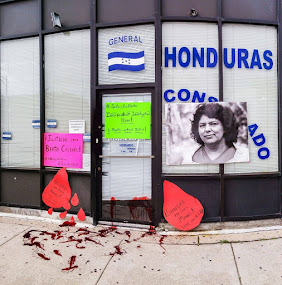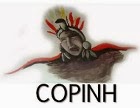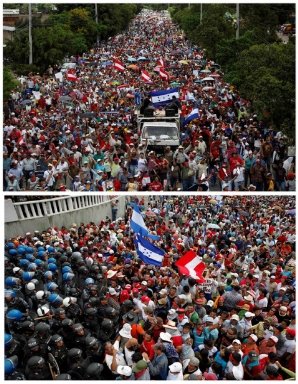COPINH DENOUNCES REPRESSION IN Río Blanco [Original en español]
 |
| Alan Garcia after being shot |
COPINH must again denounce the constant threats and intimidation against the Lenca people of the Río Blanco community that is fighting against the Agua Zarca Hydroelectric Project. In the months since the assassination of our General Coordinator Berta Cáceres, there have been a series of incidents and threats that reflect the Strong climate of violence and repression against members of COPINH who oppose the building of the Agua Zarca Hydroelectric Project. These incidents are directly linked to members of the DESA corporation and the repressive branches of the State.
We denounce the following:
On July 23rd, 2016, around 6pm, COPINH member Alan García, who was shot by the army during their assassination of his father Tomás García three years ago, was threatened with a firearm when a man came into the community, took out a gun and pointed it at Alan. In recent months, a group of DESA-affiliated hitmen has come to the community of La Tejera, Río Blanco around midnight threatening to burn down the houses of COPINH members while they sleep in them.
Organization members were informed that Jorge Ávila, DESA’s chief of security, has photos of COPINH members in Río Blanco in order to identify and attack them, which is on top of Jorge Ávila telling other people that he is going to look for the houses of certain COPINH members to kill them. We also denounce that a DESA employee threatened to kill Armando Pineda Sánchez, another COPINH member.
We denounce the collusion of the National Police with the DESA corporation to repress COPINH members, especially a member of the National Police who was apparently transferred to the area from the Bajo Aguán. In April, the officer from the National Police beat a member of COPINH, telling him “I am used to killing people. It’s not just one person I’ve killed; I’ve got a whole cemetery. COPINH people are even easier to kill.” Meanwhile, the chief of security for DESA and two DESA security guards looked on and laughed.
We denounce the following:
On July 23rd, 2016, around 6pm, COPINH member Alan García, who was shot by the army during their assassination of his father Tomás García three years ago, was threatened with a firearm when a man came into the community, took out a gun and pointed it at Alan. In recent months, a group of DESA-affiliated hitmen has come to the community of La Tejera, Río Blanco around midnight threatening to burn down the houses of COPINH members while they sleep in them.
Organization members were informed that Jorge Ávila, DESA’s chief of security, has photos of COPINH members in Río Blanco in order to identify and attack them, which is on top of Jorge Ávila telling other people that he is going to look for the houses of certain COPINH members to kill them. We also denounce that a DESA employee threatened to kill Armando Pineda Sánchez, another COPINH member.
We denounce the collusion of the National Police with the DESA corporation to repress COPINH members, especially a member of the National Police who was apparently transferred to the area from the Bajo Aguán. In April, the officer from the National Police beat a member of COPINH, telling him “I am used to killing people. It’s not just one person I’ve killed; I’ve got a whole cemetery. COPINH people are even easier to kill.” Meanwhile, the chief of security for DESA and two DESA security guards looked on and laughed.
In the crop fields that were illegitimately sold to DESA in Río Blanco, threats continue against members of COPINH who are cultivating corn and beans on their ancestral lands. At the end of June, two COPINH members’ fields were sprayed with poison and destroyed. On May 23rd, Aquilino Madrid, who has ties to DESA and a long history of threats against COPINH members who oppose the Agua Zarca Project, pointed a rifle at a group of 25 COPINH members who had showed up to work the land in the Vega del Achotal area. He also threated a minor that he would hurt him if he found him. On June 10th, he showed up armed again at Vega del Achotal. Despite the destruction of the harvests and the threats, the Lenca people continue to cultivate the ancestral lands that were illegitimately seized.
We denounce the attempts to silence those who tell the International community about the reality of the Agua Zarca Project. A few weeks after Rosalina Domínguez and Francisco Javier Sánchez, leaders of the Indigenous Council of Río Blanco, came back from Europe where they had demanded the definitive withdrawal of Banks FMO and FinnFund from the Agua Zarca Project, 4 hooded men were asking for the two of them in Río Blanco at night.
In addition, we denounce an act of intimidation of International press during a visit to Río Blanco. When the journalists travelled to the Gualcarque River by car, they found several tree branches blocking their way, which, despite seeming odd, they removed and continued. After visiting the river, they started heading back but found that someone had but several logs in the road to block their path. Further up the road they again found their way blocked, someone having placed several large rocks in the middle of the road that had not been there hours before. This act of intimidation against the international press is explained by the interests of those who do not want the media to report on the reality of the Agua Zarca Project, a project that has resulted in death and violence.
COPINH calls for national and international solidarity in response to the threats against the Lenca people of Río Blanco organized in opposition to the Agua Zarca Project. We demand the definitive cancellation of this hydroelectric Project and the immediate and definitive withdrawal of all of the Banks financing the Agua Zarca project.
We demand that the Central American Bank for Economic Integration (CABEI), the FMO and Finn Fund definitively cancel their loans to the Agua Zarca Project. We express our solidarity with the Ngäbe Bugle people of Panamá, who are also defending their territory against anotehr Project financed by the FMO Bank, called the Barro Blanco Hydroelectric Project. We call on FMO and all Banks to stop investing in projects that violate the rights of indigenous peoples, especially the right to free, prior, and informed consent.
In addition, we denounce that the Deutsche Bank Trust Company Americas, registered on Wall Street in New York, is the Offshore Guarantor for the Agua Zarca Project and therefor also shares responsibility for the human rights violations of the Lenca people since the initiation of this hydroelectric project, including the assassination of our leader Berta Cáceres.
We demand that the Banks immediately cut ties to teh Agua Zarca Hydroelectric Project. There have already been too many assassinations of COPINH members defending the Gualcarque River. We don’t want any more threats or assassinations.
COPINH re-affirms the struggle for life and in defense of the Gualcarque River, a sacred driver where the spirit of our Berta lives, along with the spirits of the girls and all of the martyrs of Río Blanco.
We demand the immediate and definitive cancellation of the Agua Zarca Project.
No more repression against COPINH and the Lenca people.
No more people assassinated for defending the Gualcarque River.
La Esperanza, Intibucá, June 27th, 2016
With the ancestral strength of Berta, Iselaca, Etempica and Mota we raise our voices full of Life, Justice, Peace, Dignity and Freedom.
Berta lives and the struggle continues!
COPINH
COPINH calls for national and international solidarity in response to the threats against the Lenca people of Río Blanco organized in opposition to the Agua Zarca Project. We demand the definitive cancellation of this hydroelectric Project and the immediate and definitive withdrawal of all of the Banks financing the Agua Zarca project.
We demand that the Central American Bank for Economic Integration (CABEI), the FMO and Finn Fund definitively cancel their loans to the Agua Zarca Project. We express our solidarity with the Ngäbe Bugle people of Panamá, who are also defending their territory against anotehr Project financed by the FMO Bank, called the Barro Blanco Hydroelectric Project. We call on FMO and all Banks to stop investing in projects that violate the rights of indigenous peoples, especially the right to free, prior, and informed consent.
In addition, we denounce that the Deutsche Bank Trust Company Americas, registered on Wall Street in New York, is the Offshore Guarantor for the Agua Zarca Project and therefor also shares responsibility for the human rights violations of the Lenca people since the initiation of this hydroelectric project, including the assassination of our leader Berta Cáceres.
We demand that the Banks immediately cut ties to teh Agua Zarca Hydroelectric Project. There have already been too many assassinations of COPINH members defending the Gualcarque River. We don’t want any more threats or assassinations.
COPINH re-affirms the struggle for life and in defense of the Gualcarque River, a sacred driver where the spirit of our Berta lives, along with the spirits of the girls and all of the martyrs of Río Blanco.
We demand the immediate and definitive cancellation of the Agua Zarca Project.
No more repression against COPINH and the Lenca people.
No more people assassinated for defending the Gualcarque River.
La Esperanza, Intibucá, June 27th, 2016
With the ancestral strength of Berta, Iselaca, Etempica and Mota we raise our voices full of Life, Justice, Peace, Dignity and Freedom.
Berta lives and the struggle continues!
COPINH































